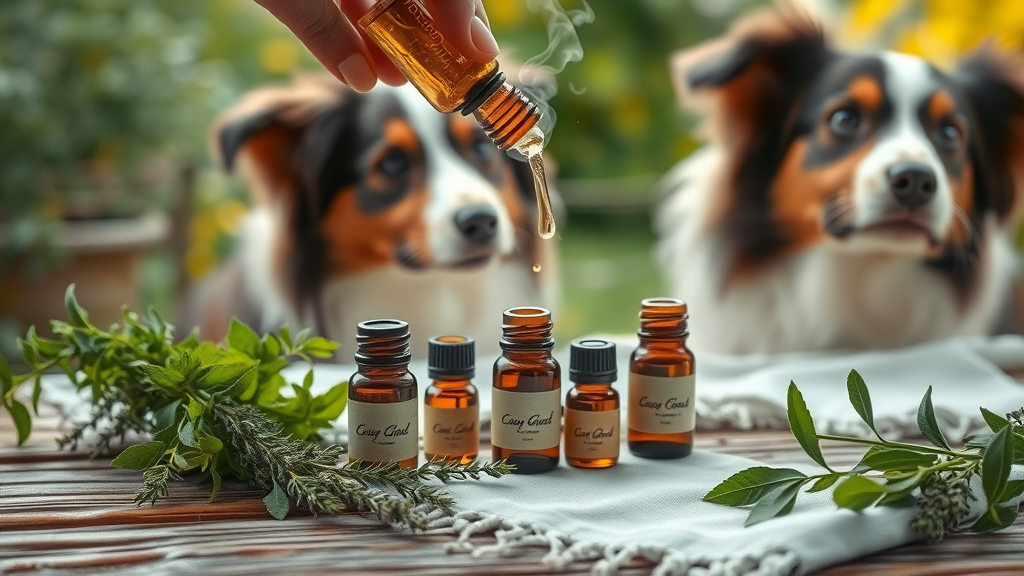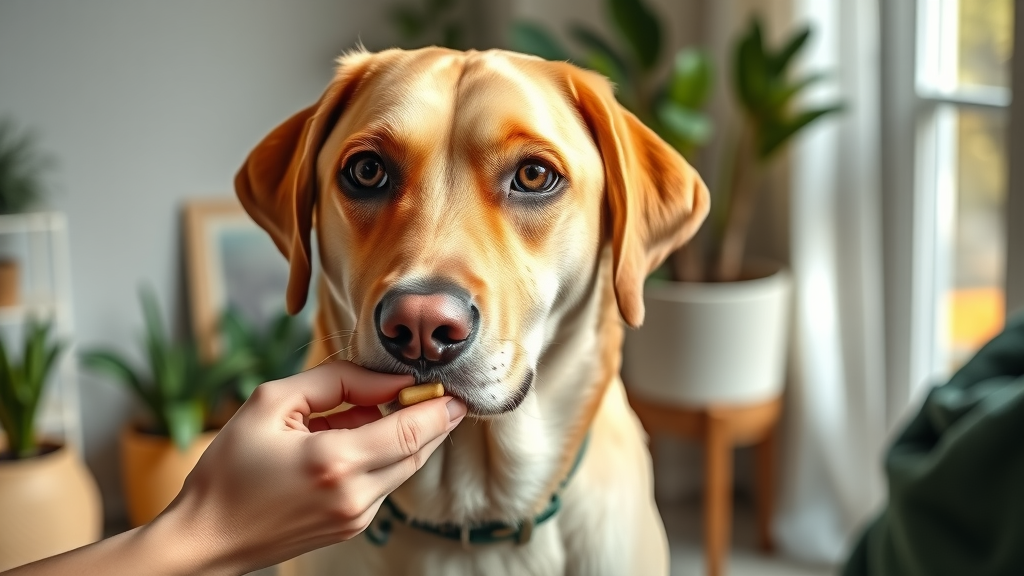Did you know nearly 1 in 3 dog owners use home remedies or natural pet solutions for everyday health issues? As pet parents get more proactive about their dogs’ well-being, integrating natural pet care and adopting remedies for dogs isn’t just a fleeting trend—it’s fast becoming a smart, holistic way to ensure long-term health without unnecessary chemicals or side effects. In this educational guide, you’ll unlock the secrets of common dog ailments and natural cures, and learn actionable steps to keep your furry companion happy, comfortable, and thriving, the natural way.
Why Understanding Common Dog Ailments and Natural Cures Is Essential for Modern Pet Owners
For today’s modern pet owner, knowing how to recognize and manage common dog ailments and natural cures is more than a hobby—it’s a necessity. As more families welcome dogs into their homes, the number of potential health problems also rises. Being prepared to identify and address symptoms with natural remedies empowers pet parents to respond quickly and reduce dog stress, vet bills, and the risk of chronic illness taking root.
When you spot a health issue like dry skin , digestive troubles, or anxiety early—and act with time-tested pet remedies —you support your dog's immune system and promote healing from within. Integrating holistic pet care practices like diet, supplements, and gentle herbal treatments can minimize the need for pharmaceuticals, ensuring your dog stays comfortable and cared for. This shift towards natural pet solutions is not only a reflection of modern wellness trends but a proven strategy for lifelong canine health.

- Did you know nearly 1 in 3 dog owners use home remedies or natural pet solutions for everyday health issues? Explore why integrating natural pet care and remedies for dogs isn’t just a trend, but a necessary shift for your pet’s long-term wellness.
What You’ll Learn About Common Dog Ailments and Natural Cures
- How to recognize the top common dog ailments
- Evidenced-based natural pet remedies for each issue
- Safe essential oil applications and home remedies for dogs
- Benefits of holistic pet care and natural pet supplements
- Step-by-step guides for implementing remedies for your pet
Overview: Identifying Common Dog Ailments and Natural Cures
Every pet parent should feel empowered to recognize warning signs and act swiftly when their dog isn’t feeling their best. The most common dog ailments —such as dry skin , digestive woes, ear issues, minor injuries, or anxiety—can signal both short-term discomfort and deeper health problems. Learning the symptoms and the matching natural pet remedies equips you to provide comfort and relief at home, reducing stress for both you and your furry companion.
Observation is key: track changes in your dog’s behavior, appetite, coat, and energy. Holistic pet care is rooted in preventive actions and early intervention, which means you’ll want to become familiar with home remedies and natural supplements as soon as any health problem appears. Whether you're dealing with an itchy skin flare-up or an upset stomach, evidence-based herbal treatments , essential oils, and time-tested ingredients can offer support, often in a gentler way than conventional drugs.
Top Symptoms Signaling Your Dog Needs Natural Remedies
- Dry skin, itching, hot spots
- Upset stomach, vomiting, or diarrhea
- Ear infections and yeast overgrowth
- Minor wounds and paw pad injuries
- Anxiety and stress behaviors

If you notice your dog constantly scratching, biting at their skin, showing digestive discomfort, shaking their head, or limping from a paw injury, it’s time to consider natural pet remedies . Even subtle changes—like restlessness, repeated licking, or a dull coat—could indicate an underlying health issue that responds well to gentle, holistic interventions. By tuning in early, you prevent minor annoyances from ballooning into bigger vet visits and ensure your dog has the best shot at swift, natural recovery.
Home Remedies Every Pet Owner Needs for Common Dog Ailments
Having a toolkit of trusted home remedies for dogs is invaluable for the proactive pet parent. Addressing issues with proven natural pet remedies—like coconut oil for skin, Epsom salt soaks for sore paws, or pumpkin for digestive issues—can help relieve symptoms and support your dog’s resilience. It's not just about fast fixes, but about nurturing a holistic pet care environment that minimizes persistent health problems and recognizes the role of prevention.
Below, we dive deep into targeted, safe pet remedies for common canine complaints, empowering you to tackle problems as they arise. These step-by-step solutions rely on accessible, non-toxic ingredients, blending supportive herbal treatments for pets with at-home techniques trusted by top veterinarians. Remember: when in doubt, always call your vet, but for minor upsets, these remedies are the first line of defense for compassionate, effective home care.
Natural Pet Remedies for Dry Skin and Hot Spots
- Using coconut oil and Epsom salt baths
- Herbal treatments for pets with calendula, chamomile, or aloe
- Avoiding irritants for holistic pet care
Dry skin and hot spots are common dog ailments often triggered by allergies, environmental irritants, or even stress. Thankfully, natural solutions offer gentle yet powerful relief. Applying coconut oil topically moisturizes itchy skin, reduces inflammation, and supports faster healing of minor wounds. For localized skin discomfort or sore paws, Epsom salt baths draw out toxins and soothe inflammation—simply dissolve the salt in warm water and let your dog soak for a few minutes, two to three times a week.
Herbal treatments like calendula, chamomile tea soaks, or aloe gel (always pure and dog-safe) can address persistent itching and speed skin recovery. Avoid harsh shampoos, fragrances, and cleaning products that may trigger reactions. When combined with a diet rich in fatty acids (such as from fish oil supplements), these home remedies for dog skin issues foster a naturally glossy coat and reduce irritation from within. If a health issue persists or worsens, always check with your vet for guidance.
Home Remedies for Upset Stomach and Digestive Issues in Dogs
- Safe applications of pumpkin, slippery elm, and probiotics
- Essential oils to support digestion—what’s safe and what to avoid
- Hydration and bland diet techniques
An upset stomach or sudden digestive trouble—vomiting, diarrhea, or loss of appetite—can happen to any dog. Start with a short fast and offer small servings of plain, cooked pumpkin or slippery elm powder, which soothes inflamed stomachs and bulks stools. Probiotics —either in supplement form or natural yogurt—restore healthy gut flora, speeding up recovery. For mild cases, a bland diet of boiled chicken and white rice helps reset digestion and calms GI irritation.
While some essential oils (like ginger or fennel in diluted, minute quantities) may ease nausea or gas, others are risky—always research or check with your vet before adding anything new. A focus on hydration is crucial; keep water readily available and monitor for signs of worsening. If your dog experiences ongoing or severe digestive issues , it’s best to call your vet, but most mild cases respond quickly to these gentle and evidence-backed home remedies for dogs .

Pet parent vigilance pays off: reintroduce regular food slowly as symptoms improve, and add fatty acids via fish oil for an overall gut and skin health boost. Holistic pet care for the digestive system isn’t just about treating problems as they arise, but about providing balanced nutrition and minimizing exposure to new or irritating foods.
Natural Pet Remedies for Ear Infections and Yeast
- Apple cider vinegar/rubbing solutions for gentle ear care
- Homeopathic remedies and natural pet supplements
- Pet care tips for preventing recurrence
Ear infections and yeast overgrowth are frequent among dogs with floppy ears, allergies, or a history of moisture build-up. An at-home cleaning solution—equal parts apple cider vinegar and filtered water—can be used to gently clean the outer ear (never deep inside). Saturate a cotton ball with the mixture and wipe the visible areas, avoiding insertion too far. This creates an environment unfriendly to yeast and bacteria while soothing inflammation.
Certain homeopathic remedies and natural pet supplements —like probiotics or gentle herbal ear drops containing calendula—may be recommended by holistic vets to further prevent flare-ups. Key pet care habits include drying your dog’s ears after swims and using ear cleaning solutions weekly. If symptoms worsen or your dog shows signs of pain, always call your vet—chronic or severe cases may require antibiotics or professional intervention.
Essential Oils and Herbal Treatments for Common Dog Ailments
With interest rising in holistic pet care , many dog owners wonder how essential oils and herbal treatments fit into safe, effective routines. Not all products labeled “natural” are safe; some essential oils can be toxic if misused. Knowing which options are scientifically validated and how to apply them properly protects your pet and maximizes their benefits—relieving everything from anxiety to skin irritation in conjunction with nutrition and modern pet care standards.
Let’s separate fact from myth and explore the world of evidence-based natural pet remedies for your canine companion, from gentle diffusions to topical or supplement applications.
Which Essential Oils Are Safe for Dog Home Remedies
- Eucalyptus, lavender, and tea tree—myths and facts
- Dosage, administration, and what to watch for
- Holistic pet care with herbal treatments
While lavender essential oil (diluted) is widely considered safe for reducing stress and promoting calm, oils like tea tree are often mistakenly used and can be toxic in even small doses. A few drops of lavender or chamomile in a diffuser can soothe anxiety, but nebulizing or direct contact is not recommended unless guided by a professional. Eucalyptus oil, when very diluted, may help repel bugs, but always observe your dog for any signs of discomfort or sensitivity.
Only use essential oils labeled safe for canine use, diluted properly (often in a carrier like coconut oil), and never force topical applications near the mouth, nose, or genitals. If your dog licks or ingests an essential oil by accident, call your vet immediately. Holistic pet care means understanding both benefits and risks, so always research, start with minimal amounts, and consult your veterinarian. As with any natural pet remedies , monitor your dog’s reaction and discontinue use at the first sign of irritation.

Herbal Treatments for Pets: From Arnica to Turmeric
- Conditions best treated with herbal remedies
- Natural pet supplements: Dosage and safety
- Vet-approved herbal treatments for pet ailments
Herbal remedies like arnica (for bruising/soreness), turmeric (potent natural anti-inflammatory), and milk thistle (liver support) are time-honored solutions in holistic pet care . When used as directed—typically in supplement form for dogs and under the supervision of a holistic vet—these treatments address various health problems safely and effectively. Turmeric is especially valued for chronic joint pain or minor inflammation: combine with a healthy fat like coconut oil and a pinch of black pepper for the best absorption.
Dosing is critical: always choose veterinary-formulated supplements or herbal treatments for pets , not those meant for humans. Watch out for allergic reactions, and introduce one new remedy at a time. These pet remedies can boost quality of life and may reduce the need for pharmaceuticals, but they should not replace professional care for serious or worsening symptoms. A partnership between natural and conventional approaches delivers the most complete solution for your dog’s well-being.
Holistic Pet Care: Preventative Natural Remedies for Dogs
Prevention is central to holistic pet care . Integrating natural pet supplements , regular exercise, thoughtful nutrition, and a soothing environment builds resilience against the most common dog ailments. By supporting core systems—immune, skin, gut—you help cut down on vet visits and boost day-to-day comfort for your dog. Proactive routines not only minimize flare-ups of issues like dry skin or upset stomach but encourage a lasting bond through gentle, attentive care.
Modern pet care isn't just about fixing problems as they occur; it's about creating an environment where problems are less likely to arise. Let’s see how you can set up sustainable, whole-dog well-being around natural, daily actions and supplements tailored to your dog’s unique needs.
Integrating Natural Pet Supplements and Pet Care Routines
- Daily steps for holistic pet health
- Pet supplements: omega oils, probiotics, and anti-inflammatories
- Creating an environment that reduces common health issues

Adding pet supplements —like omega-3-rich fish oil, probiotics, and natural anti-inflammatories—can fortify your dog’s skin, coat, and immune system. These daily boosters, recommended by holistic vets, help prevent dry skin , reduce inflammatory flare-ups, and maintain digestive health. For best results, introduce supplements gradually, monitor for reactions, and always select those formulated for canine use. Keep up with annual vet exams to ensure your supplement schedule complements overall healthcare.
Routine matters: Establish regular exercise, mental stimulation, and access to clean water. Minimize exposure to toxins or allergens, and create peaceful spaces free of loud noises or stress triggers. Good pet care goes hand-in-hand with vigilance—notice small changes, address them early with home remedies , and foster a wellness lifestyle to help your dog feel their best, every day.
Home Remedies for Dogs: Natural Solutions for Minor Injuries and Wound Care
- Epsom salt soaks for paws and wounds
- Calendula-infused ointments
- Preventing infection naturally
Minor cuts, scrapes, or irritated paw pads happen to every adventurous pup. Keeping Epsom salt handy allows for quick, soothing soaks that help reduce swelling and draw out bacterial contaminants—filling a small basin with warm water and Epsom salt, soak your dog’s paws, and gently pat dry. For shallow wounds or hot spots, apply calendula-infused ointment —its antibacterial and anti-inflammatory properties encourage speedy, non-toxic healing.
Clean minor injuries promptly, keep the area dry, and prevent licking with an e-collar if needed. These simple home remedies for dogs avoid harsh chemicals and paves the way for fast recovery. If an injury fails to heal or appears infected (red, oozing, or swelling), call your vet. Holistic pet care is about both confidence and caution: know when to use home remedies, and when professional help is the safest next step.
| Ailment | Symptoms | Natural Cure | Expected Results |
|---|---|---|---|
| Dry Skin & Hot Spots | Itching, red patches | Coconut oil, calendula, Epsom salt | Reduced itching, faster healing |
| Upset Stomach | Vomiting, diarrhea, loss of appetite | Pumpkin, probiotics, bland diet | Settled stomach, normal stool |
| Ear Infections/Yeast | Shaking head, odor, discharge | Apple cider vinegar rinse, probiotics | Cleaner ears, less recurrence |
| Minor Injuries | Cuts, scrapes, paw swelling | Epsom salt soaks, calendula ointment | Quick pain relief, reduced swelling |
| Anxiety/Stress | Pacing, whining, destruction | Lavender essential oil, exercise, CBD | Calmer behavior, improved relaxation |
Home Remedies for Anxiety, Stress, and Behavioral Health in Dogs
Behavioral challenges like anxiety or stress can undermine your dog’s quality of life and may lead to secondary health issues such as digestive problems or skin outbreaks. Fortunately, home remedies for dogs include calming essential oils, routine behavioral enrichment, and safe herbal supplements. These approaches, underpinned by holistic pet care philosophy, help prevent major problems while restoring emotional balance for sensitive or rescue dogs.
Helping your pet means identifying triggers—such as thunderstorms, separation, or new environments—and building a toolbox of natural pet remedies to soothe nerves, lower cortisol, and encourage a confident, relaxed demeanor outside the vet’s office.
Natural Pet Remedies and Essential Oils for Calming Dogs
- Safe essential oil diffusing (lavender, chamomile)
- Behavioral remedies: exercise, environmental enrichment
- Herbal treatments and CBD options

For natural anxiety relief, use a pet-safe diffuser with lavender or chamomile essential oil (in a large, well-ventilated space). Pair this with increased exercise and games that challenge your dog's mind, like food puzzles or nosework. Herbal supplements—such as valerian root or CBD drops (vet-formulated)—can complement these remedies, especially for noise sensitivity or travel anxiety.
Always start new natural pet remedies in small amounts and watch for drowsiness or digestive upset. Holistic pet care means addressing both mind and body: a predictable daily routine, plenty of affection, and a tranquil home setup are the foundation of behavioral wellness for your furry friend. For serious or ongoing behavioral problems, combine home remedies with professional training or veterinary consults.
Expert Insights: Vet-Recommended Natural Pet Remedies
Modern veterinarians often partner with pet parents by recommending natural and homeopathic remedies as part of a comprehensive care plan. While traditional veterinary medicine is crucial for severe or acute conditions, integrating essential oils , herbal supplements, and holistic pet care routines delivers a fuller spectrum of support—preventing minor health problems from escalating to emergencies.
“Natural pet remedies, when chosen carefully and applied correctly, can support your dog’s body in healing itself, reduce reliance on pharmaceuticals, and prevent minor issues from becoming major.” — Dr. Sophia Grant, DVM
| Remedy | Common Use | Safe For Dogs? | Key Cautions |
|---|---|---|---|
| Lavender Essential Oil | Anxiety, skin irritation | Yes (diffused, diluted) | Never ingest or apply undiluted |
| Tea Tree Oil | Skin problems | No | Toxic if ingested/topical |
| Calendula | Wounds, skin healing | Yes (ointment, rinse) | Use pure, no additives |
| Turmeric | Joint pain, inflammation | Yes (supplemental, dosage important) | Check for digestive upset |
| CBD Oil | Anxiety, pain, seizures | Yes (vet-formulated) | Monitor for sedation, check with vet |
| Colloidal Silver | Antibacterial, wound care | Sometimes (controversial, check with vet) | Do not overuse, risk of toxicity |
People Also Ask: Answers to Your Top Questions About Common Dog Ailments and Natural Cures
How to cure a sick dog at home naturally?
- Use gentle home remedies like bland diets (boiled chicken and rice), hydration, probiotics, and rest. For skin or paws, coconut oil or Epsom salt soaks can help. Always consult your vet before starting new pet remedies.
What is the strongest natural anti-inflammatory for dogs over?
- Turmeric and omega-3 rich fish oil are top natural anti-inflammatories for dogs. Herbal treatments for pets should be given with veterinarian guidance, especially for chronic or severe conditions.
What is holistic medicine for dogs?
- Holistic pet care for dogs incorporates nutrition, lifestyle, home remedies, natural pet supplements, and limited conventional medicine to support body, mind, and spirit for better health outcomes.
What is the strongest natural antibiotic for dogs without a vet?
- Manuka honey, oregano oil, and colloidal silver often act as natural antibiotics, but their use should be monitored and ideally supervised by a veterinary professional for safety.
FAQs: Common Dog Ailments and Natural Cures
- Are essential oils safe for dogs?
- How do I introduce natural pet supplements?
- When should I call the vet instead of using home remedies?
- Can I use the same herbal treatments for pets as for humans?
- What are the signs home remedies aren’t working?
Key Points for Safely Using Natural Cures for Common Dog Ailments
- Consult with a veterinarian before major changes
- Start with small, single-ingredient remedies
- Monitor for allergic reactions or adverse effects
- Combine natural pet remedies with preventative care
- Keep up with regular check-ups and holistic pet supplements
Your Next Steps: Embracing Home Remedies and Natural Care for Your Dog’s Wellness
- Discover safe, effective natural remedies to soothe your dog’s common health issues—no harsh chemicals, just gentle care from nose to tail.
- Give your pup the relief they deserve—explore natural remedies trusted by dog lovers for calm, comfort, and wellness.
- Tired of meds with side effects? Learn how natural remedies can support your dog’s health the gentle, holistic way.
Empower your role as a pet parent by embracing natural solutions—your dog will thank you with a healthier, happier life!
To further enhance your understanding of natural remedies for common dog ailments, consider exploring the following resources:
-
“Home Remedies for Common Dog Ailments” : This article provides practical solutions for issues like upset stomachs, itchy skin, and ear infections, offering step-by-step instructions for each remedy. ( moderndogmagazine.com )
-
“Herbal Remedies for Common Pet Ailments: An Effective and Safe Approach” : This resource delves into herbal treatments for various pet health concerns, including digestive problems, skin irritations, and anxiety, emphasizing safe and effective applications. ( urbanpethospital.com )
If you’re committed to adopting natural and holistic approaches to your dog’s health, these resources offer valuable insights and practical guidance to support your pet’s well-being.
 Add Row
Add Row  Add
Add 




Write A Comment